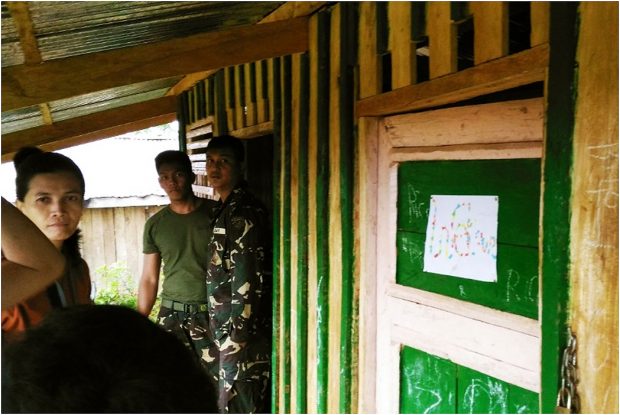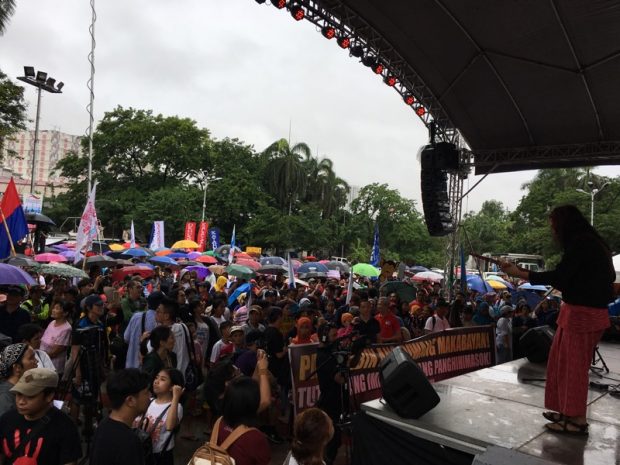Salugpongan Ta ‘Tanu Igkanogon Community Learning Center (STTICLC) in Talangingod, Davao del Norte said at least five of their campuses have either been occupied or are being harassed by government as the new school year opened today.
“Military troops have occupied our schools and conducted roving operations that hamper our members’ [work for] the start of our preparation since early last week,” Lumad school teacher Joan Esperancilla in a statement said.
At STTICLC’s Tibucag campus in Barangay Dagohoy, about 20 soldiers of the Army’s 51st Infantry Battalion camped inside the school since May 29.
In Sitio KM 30, Barangay Dagohoy, about 25 soldiers in full battle gear had been conducting patrols around the STTICLC school while occupying six houses in the community, Lumad teachers reported.
In Sitio KM 17 also in Barangay Dagohoy, about 23 soldiers camped at the Lumad school but eventually left when confronted by the teacher.
In Sitio Laslasakan, Barangay Palma Gil, more than 40 soldiers had set camp inside the Lumad school campus.
On June 3 in Sitio Nasilaban, also in Barangay Palma Gil, armed soldiers entered the campus and interrupted the students and teachers cleaning the school and asked for the whereabouts of other teachers.
Throughout the week, soldiers put up checkpoints along roads going to the communities targeting Lumad school teachers, STTICLC said.
During the Sitio Nasilaban school’s flag ceremony Monday morning, students noticed a flying machine they suspect is a military drone hovering above them.
Soldiers then arrived and ordered the students to harvest vegetables and bring the produce directly to the nearby military camp, STTILCI said.
STTILCI said the incidents have affected 241 students and 11 teachers in five campuses.
“STTILCI condemns the intimidation of the military and paramilitary forces against our teachers, students and community members in Talaingod, Davao del Norte at the opening of this school year,” the group said.

AFP soldiers occupying a Lumad school. (SOS photo)
New school year, old problems
The Save our Schools (SOS) Network said it is not only the Lumad Schools in Talaingod that face the same old problems.
At the “Bakwit School” in Haran, Davao City, Lumad students from Barangay Gupitan, Kapalong, Davao del Norte started another school year away from their community.
Lumad schoolteacher Ricky Balilid said they had been teaching the students at the evacuation center since 2015 as the threats from the paramilitary Alamara continue to hound them.
“The Alamara have looked at our school with suspicion that this is a New People’s Army school. And they have intimidated teachers, parents and even students from attending this school,” Balilid said.
Many Lumad schools set up and ran by religious groups or non-government organizations all over Mindanao suffer the same situation, SOS said.
In all, 56 schools have been forcibly closed and 18 others destroyed last school year from military and paramilitary attacks, forcing 2,000 children to stop their schooling.
There had also been 2,300 students and teachers harassed by the paramilitary and soldiers, including incidents of being forced to be included in the fake list of NPA surrenderees, the group said.
“It is sad that, while Lumad schools are helping the government and Department of Education (DepEd) in providing education opportunities for the Lumad children, they are not getting help. Instead, they are getting attacked for helping the Lumads,” SOS spokesperson Rius Valle said.
The SOS said Lumad schools have been partners with the DepEd in implementing Indigenous People’s Education Program (IPED) for the past years.
This is proof that Lumad schools are legitimate and carry DepEd programs that serve to combat illiteracy, Valle said. # (Raymund B. Villanueva)


